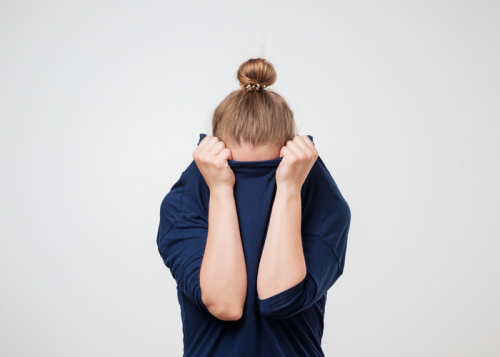Life has a way of throwing unexpected turns. For a split second, everything appears to be OK. The next instant, you’re engulfed in a tumultuous cyclone of tension and find it difficult to recall your previous calm state. It is essentially the essence of existence.

When distressing thoughts and emotions arise, you may find yourself sinking into a profound darkness of fear and despair. You can begin to think there is little you can do to control your feelings at such trying times.
Unquestionably, we belong to a fast-paced world with many obstacles to overcome every day. It’s unlikely that this will alter very quickly. Maintaining our composure during stressful circumstances can greatly improve our decision-making capacity, fortify our mental toughness, and eventually result in a more satisfying existence.
What Is Distress?
Any environmental change necessitating the body’s capacity to adapt and respond is considered stress. When exposed to these changes or transformations, the body experiences emotional, physical, and psychological responses. It is a typical aspect of existence. Your body is stressed by various external events, things you do for yourself, and things that transpire around you. Stress and anxiety can come from your surroundings, physical well-being, and thoughts, and it can be both positive and negative. Your stress response will sometimes cause negative thoughts and ruin your overall mood.
Reactions to “stressors” or distressing situations, both internal and external, are common. Feelings like grief or rage, physical experiences like discomfort or pain, and upsetting memories or ideas are examples of internal stressors. Various life occurrences and situations, whether good or bad, can bring on stress. Any occurrence, setting, or situation that has the potential to adversely impact people or the people they love (friends and family members) is considered an external stressor.
Distress is more inclined to result from stress brought on by social or economic inferiority and long-term health problems. These issues are persistent and occasionally may need a complete solution. This news may be difficult for some people to process, prolonging their sense of distressing cycle.
Conversely, discomfort is sometimes referred to as “bad” stress by people. Individuals in distress frequently suffer from feeling anxious in addition to a host of other psychological and physical symptoms, including tension headaches, sleeplessness, irritability, or inattentiveness. Stress that is strong, persistent, or frequent is harmful to both the mind and the body, and studies have connected discomfort to a number of physical and mental disorders.
Physical symptoms such as headaches, upset stomachs, high blood pressure, chest discomfort, and trouble falling asleep can result from stressful situations. According to studies, stress may also aggravate or cause a few specific illnesses or symptoms. Your adrenal glands are triggered by stress and are quickly activated by your brain to help you cope. The hormones released by these glands aid your ability to handle stressful situations and use different stress relief methods, such as relaxation techniques. Of them, adrenaline and cortisol are the most well-known.

Living In A Stressful World
When was the most recent time you experienced stress? Perhaps it happened when you ended up late for supper at your prospective in-laws’ house or when your supervisor requested an unexpected report. You would have most likely observed several bodily symptoms, such as sweating palms, a racing heart, and an overall tense feeling. That is the “alert system” of your body going into overdrive. You may need quick relief from stress, so paying attention is a must.
Characteristics or traits also matter. Those who are cheerful, upbeat, and confident can concentrate on the positive elements of a difficult circumstance, which enables them to come up with effective solutions. People who don’t have support or who have self-doubt may be more prone to anxiety because they think that the challenge is too big and unsolvable.
Fortunately, calmness and composure can be developed even in the face of chaos. It all comes down to developing mental calmness. Furthermore, while there isn’t a foolproof, quick answer for reducing stress (since it is difficult to totally eradicate stress from our lives), following helpful tips and advice should help you handle difficult situations more skillfully when they arise.
Tips To Calm Distress
Use Your Senses
Simple foundational exercises that use your five senses—sight, touch, smell, hearing, and taste can be practiced. Play some relaxing music, or enjoy the sound of the birds singing in the woods. You can relieve stress and treat yourself to a self-facial massage treatment or give yourself a warm bath. If you can, pamper yourself in something you typically can’t. A handful of potato chips is plenty! On your approach home, take a diversion to smell the freshly cut grass or flowers in the botanical garden. This might assist you in staying calm to concentrate better on the here and now and less on your worried thoughts. You may also inhale the new rain’s clean street scent to improve mood regulation.
Safe Physical Sensations
It is extremely difficult to realize what is going on around you or to you when fear and distress take hold. When feeling panicked or anxious, focus on a safe physical activity or diversions, such as taking a walk in the park or practicing meditation. Eat sour food, hold a piece of ice cube, or slap a rubber band over your wrist. In moments of chaotic distress, these feelings serve to stabilize you. If you’ve ever self-harmed, you are aware that the temptation to harm oneself might come on suddenly or in reaction to certain stimuli. That’s why it’s always beneficial to have coping strategies for anxiety and options for self-injury to assist you in resisting the impulse when it arises.
Compare Your Situation
This is usually strongly discouraged. However, when you’re in the thick of things, reflect on what’s happening. Recall a period when you experienced similar or worse feelings and acknowledge that it will end. Admire the power that you had back then, but keep in mind that your strength has only increased since. Consider the positive aspects of life and concentrate on its therapeutic benefits. Keep a pleasant attitude on all occasions while learning to manage your emotions. It’s preferable to save your energy. You can reflect on previous mistakes and draw lessons from what went wrong. Analyze your circumstances to stay calm and ahead of your mental fortitude and permit yourself to practice emotional control.
Create Competing Emotions
See a hilarious movie or peruse the newspaper’s comics section if you’re depressed. Videos of cats and watchdogs or birds making buddies. Draw on a loose scrap of paper or listen to calming music if you’re anxious or agitated. Deep breath in relaxing scents such as spearmint or lavender, or sip a cup of soothing tea. If you’re going crazy, get a soft object while focusing on a few deep breaths of the fresh air. Remain still until the wave goes by, and then admire how its delicate nature withstood the storm.

Focus On Your Thoughts
Your distress may occasionally be entirely psychological. Calmness may be all that is needed for some of the problems you are facing. You can concentrate on your ideas if you are aware of the internal calming effect they have on you. With that in hand, you can divert your attention by counting to ten, mentally reciting a poem, reading a book, or watching a humorous television program. Generally speaking, using a mantra helps you focus your thoughts. Recall that change is the only thing that never changes. Concentrate on what’s on your mind while experiencing anxiety, emotional volatility, or mental difficulties. Focus on appreciation and affirmations if they are the bad ones.
Burn Your Distress
Frequently, we discover that these sources of grief are uncontrollable and that there is absolutely nothing we can do about them. Recognize the emotional and mental struggle you are facing by writing down your trauma, crumpling it up, and then burning or discarding it. When you burn it, you can observe the issue disintegrate into harmless dust particles. Breathe more deeply and release it. Although deep breathing might not be the best solution for your problems, this method will guide you toward healthy coping mechanisms.
Activity
Take on a thought-provoking activity. Put the switch on that you’ve been putting off at last. Start and complete a modest activity. It might involve working with wood, repairing the metal, decluttering your house, or even creating anything from the start. Make use of your interests as a shield. You can cook, complete schoolwork, compose a letter to a loved one, or practice an instrument. It’s beneficial in many ways to spend time on a project that helps distract you from stress. Additionally, you may always stick to the tried-and-true exercise activity if other pursuits need to be more relaxed and complex.
Contribute
Pay attention to something besides yourself. Offer assistance, greet a stranger with a smile, carry out a kind deed, prepare a sandwich for your younger brother, bring your mother a hot beverage or coffee, open the door for a hastily entering person, and assist a parent with carrying a baby on the bus. Allow their thanks to fill you, and know that you continue to have something to offer even when everything seems gone.
Final Thoughts And Takeaways
Good or negative stress is contingent upon a multitude of situational conditions. People who are temporarily or mildly stressed can channel their mental resources into being creative and productive. Chronic stress, on the other hand, can seriously hinder functioning, making people feel as though they are unable to even achieve their most basic demands.
Everyone uses techniques for coping at some point in their lives. The most crucial thing is to accept their existence and ensure they don’t endanger your life, well-being, or finances. It’s important to figure out what you’re looking for and what suits you. You can use these useful suggestions to assist you in getting through any distress if you don’t have any healthy coping strategies or discover that going it alone isn’t effective any longer.
































